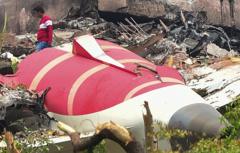India's Aircraft Accident Investigation Bureau is deliberating whether to send the flight data and cockpit voice recorders from the recent Air India crash overseas for detailed analysis, while safety inspections on the airline's fleet are underway after the disaster.
India Weighs Options for Analyzing Air India Crash Black Boxes

India Weighs Options for Analyzing Air India Crash Black Boxes
The investigation into the tragic Air India crash that left 270 dead faces critical decisions on data analysis location.
India's Aircraft Accident Investigation Bureau (AAIB) is currently assessing whether to send the flight data and cockpit voice recorders, commonly known as black boxes, from the Air India crash abroad for decoding and analysis. The tragic incident, which occurred last Thursday, resulted in the deaths of at least 270 people, primarily passengers, when the London-bound Boeing 787-8 Dreamliner went down shortly after departing from Ahmedabad airport in western India.
While some reports suggested that the black boxes would be dispatched to another country for examination, the ministry of civil aviation stated that no final decisions have been made yet. The AAIB is expected to choose the analysis location based on a comprehensive review of technical, safety, and security considerations.
Investigators have successfully recovered both sets of Enhanced Airborne Flight Recorders (EAFRs) from the crash site, which were retrieved on June 13 and June 16. These advanced devices are essential for providing a detailed account of the last moments of the flight, capturing critical data, including engine performance and flight configurations.
Concerns have emerged regarding potential damage to the recorders due to the post-crash fire, which could complicate data recovery efforts in India. Captain Kishore Chinta, a former AAIB investigator, noted that sending a recorder to the United States could facilitate a comparison of data with that obtained by the National Transportation Safety Board (NTSB). Although a new AAIB lab in Delhi was inaugurated recently, its full operational capabilities for EAFR data extraction remain uncertain.
In related news, Air India’s chairman confirmed that one of the aircraft's engines was new, while the other was not scheduled for servicing until December. The airline has since completed inspections on a majority of its Boeing 787 fleet, which has been cleared for operations. In light of the crash, India’s aviation regulator mandated additional safety checks across Air India’s Boeing 787s.
Additionally, Air India announced a temporary reduction in flights on 16 international routes and the suspension of services to three foreign destinations between June 21 and July 15, a move to implement enhanced safety protocols and manage increased flight durations due to Middle Eastern airspace restrictions.



















